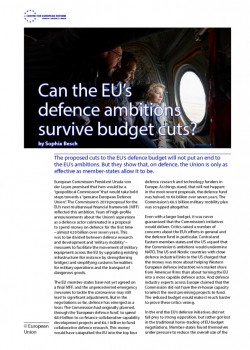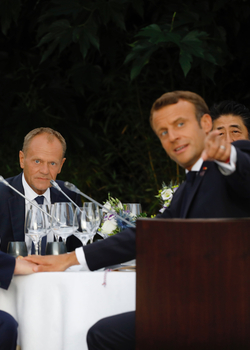
Can the EU's defence ambitions survive budget cuts?
The proposed cuts to the EU’s defence budget will not put an end to the EU’s ambitions. But they show that, on defence, the Union is only as effective as member-states allow it to be.
European Commission President Ursula von der Leyen promised that hers would be a “geopolitical Commission” that would take bold steps towards a “genuine European Defence Union“. The Commission’s 2019 proposal for the EU’s next multiannual financial framework (MFF) reflected this ambition. Years of high-profile announcements about the Union’s aspirations as a defence actor culminated in a proposal to spend money on defence for the first time – almost €20 billion over seven years. This was to be divided between defence research and development and ‘military mobility’ – measures to facilitate the movement of military equipment across the EU by upgrading existing infrastructure (for instance by strengthening bridges) and simplifying customs formalities for military operations and the transport of dangerous goods.
The EU member-states have not yet agreed on a final MFF, and the unprecedented emergency measures to tackle the coronavirus may still lead to significant adjustments. But in the negotiations so far, defence has emerged as a loser. The Commission had originally planned, through the ‘European defence fund’, to spend €8.9 billion to co-finance collaborative capability development projects and €4.1 billion to fund collaborative defence research. This money would have catapulted the EU into the top four defence research and technology funders in Europe. As things stand, that will not happen: in the most recent proposals, the defence fund was halved, to €6 billion over seven years. The Commission’s €6.5 billion military mobility plan was scrapped altogether.
Even with a larger budget, it was never guaranteed that the Commission’s initiatives would deliver.
Even with a larger budget, it was never guaranteed that the Commission’s initiatives would deliver. Critics raised a number of concerns about the EU’s efforts in general and the defence fund in particular. Central and Eastern member-states and the US argued that the Commission’s ambitions would undermine NATO. The US and Nordic countries with close defence industrial links to the US charged that the money was more about helping Western European defence industries win market share from American firms than about turning the EU into a more capable defence actor. And defence industry experts across Europe claimed that the Commission did not have the in-house capacity to select the most promising projects to fund. The reduced budget would make it much harder to prove these critics wrong.
In the end the EU’s defence initiatives did not fall prey to strong opposition, but rather got lost in the traditional horse-trading of EU budget negotiations. Member-states found themselves under pressure to reduce the overall size of the budget, while at the same time maintaining existing priorities, such as agricultural funds or support for poorer regions. Newer programmes, such as those pertaining to defence, fell by the wayside regardless of their merits. The loss of funding for military mobility is especially hard to justify - popular with Central and Eastern member-states, who saw it as a measure to strengthen Europe’s defences against Russia, it was also a flagship initiative of EU-NATO co-operation and thus made the defence fund easier for ardent transatlanticists to swallow.
The lesson here is that while there may be a general consensus that the EU should do ‘more’ on defence, it is not yet strong enough to loosen member-states’ purse strings. The next step therefore should be to get greater agreement from member-states on the purpose of von der Leyen’s Defence Union. The new so-called ‘strategic compass’ process could help. Planned as a follow up to the EU Global Strategy, the compass aims to involve member-states in a joint threat analysis and build a consensus on what the EU should be able to do. That should help lay the foundations for greater investment in defence. But the compass process is designed to take two years – frustrating for anyone who believes that the Union needs to act to shore up European defence sooner rather than later.
The EU’s defence ambitions will not be completely stalled by the budget cuts. Too many initiatives have been set in motion over the last few years. Within the Permanent Structured Co-operation (PESCO) framework for increased defence co-operation member-states have made commitments to invest in the readiness of their national armed forces. The new Co-ordinated Annual Review (CARD) mechanism is designed to co-ordinate the defence planning of member-states. The first ever Commission Directorate-General (DG) for defence industry and space also remains. Its creation in the autumn of 2019 broke a taboo: for decades, member-states had resisted the Commission’s attempts to become more involved in the development, production and procurement of military goods and services – defence industries were traditionally considered areas of vital national interest and therefore beyond the Union’s sphere of influence. However, while the new DG has established the EU’s right to get involved in European defence industrial co-operation, a lack of funding would mean member-states risk setting it up to fail.
The push to prioritise defence has to come from the member-states themselves.
The push to prioritise defence has to come from the member-states themselves. It is likely that national leaders will continue to call for the EU to do more in this area. But so far, the budget negotiations imply that member-states do not take defence as seriously as the rhetoric of a ‘geopolitical’ Union suggests.
Sophia Besch is a senior research fellow at the Centre for European Reform.



